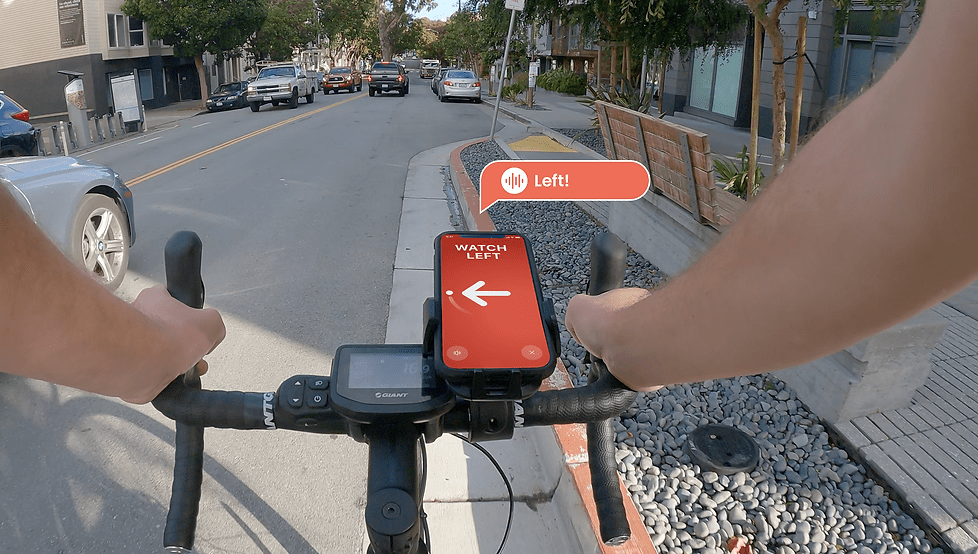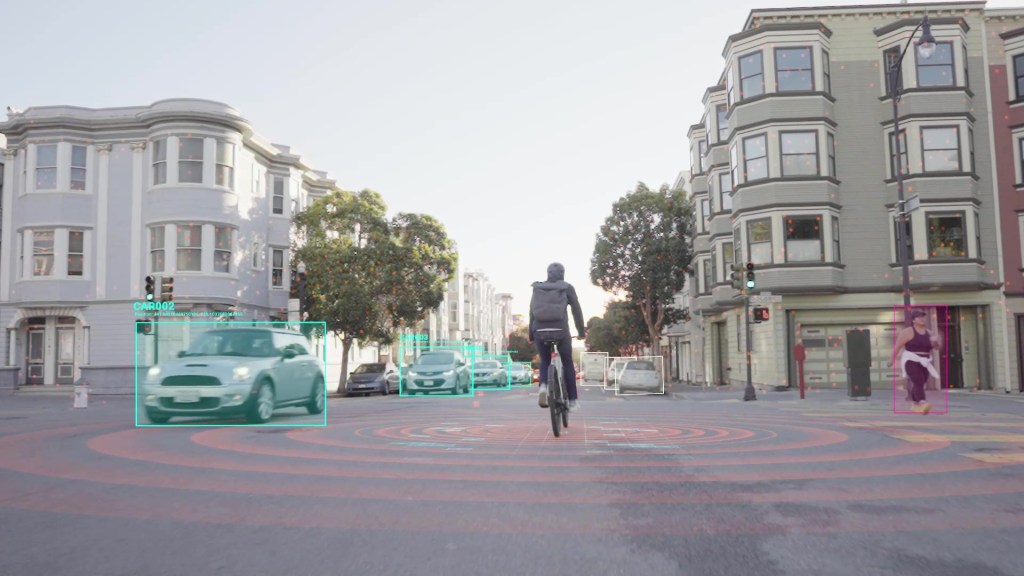Streetlogic wants to help e-bike riders have a safer experience on the road. The company announced a $2.1 million pre-seed raise, as well as the launch of its flagship product, a surround-view camera that can predict front, side and rear collisions and notify riders in order to prevent accidents.
Starting Tuesday, customers in the U.S., Canada and Europe can preorder Streetlogic’s advanced driver assistance system (ADAS) for e-bikes with a down payment of $30. The final retail price will be around $300 to $400, and the first batch of mass-produced systems is expected for delivery by the end of 2022, according to Jonathan Denby, CEO and founder of Streetlogic. Customers based in San Francisco, where Streetlogic is based, will be eligible to try one of the systems sooner via a limited, invite-only beta deployment program beginning early next year.
Streetlogic isn’t the first to come up with a micromobility ADAS system. Last year, Israeli startup Ride Vision introduced a similar AI-based system that analyzes traffic around a rider in real time, providing forward-collision alerts, blind-spot monitoring and warnings for riding too close behind another vehicle. Like Streetlogic, Ride Vision’s system can also just record the ride, acting as a dashcam that saves a record of safety incidents to review later.
More recently, computer vision companies like Luna or Drover AI have developed similar tech for e-scooters that’s operated by the likes of shared micromobility operators Voi and Spin, respectively. The technology here is similar, but the target markets are different.
“The difference is that we are custom tailoring the vision system to give smart safety features to the riders, whereas they’re using the vision system to get the riders of scooters to play more nicely on city streets,” Denby told TechCrunch. “Their features are sidewalk detection or parking compliance features that the scooter operators need to show that they’re keeping riders playing nice. Ours is just all about safety of the rider themselves, like if you’re riding in traffic this gives you an early warning if there’s a car on a collision path with you so you can keep yourself safe.”
The other major difference is that Luna and Drover can connect to the scooter’s OS and take over, causing the rider to slow to a stop if they’re riding on sidewalks or inappropriately. Streetlogic’s product is strictly a collision warning system, but that can still be a very useful tool, especially in cities.
Advanced rider assistance systems: Tech spawned by the politics of micromobility
“From a safety aspect, you don’t have eyes all around you at all times — you can’t, and when you’re going to work, it’s kind of like your retreat time, so you’re often thinking, or at least for me, I’m not thinking about safety. I’m just thinking about getting to work or all the things I have to do that day,” said Taylor, one of Streetlogic’s early beta testers who rides her e-bike to work everyday, in a testimonial on the company’s website.
The number of preventable cyclist deaths in the U.S. increased 6% in 2019 from 793 in 2010 to 1,089 in 2019, and of those, 843 were killed in crashes with motor vehicles. Even as e-bike sales soar, cars are still a threat to the adoption of micromobility in cities, where 78% of fatal cycling accidents happen. Consumers looking to replace their cars with e-bikes may want to ensure they’re riding something that has similar safety features, like an ADAS system.
“I have this utopian vision where I think the world would be great if there were more e-bikes on the roads and cities than cars, in general,” Denby told TechCrunch. “You need a few cars out there, but the majority can be bikes, so I think making your e-bike a more dependable tool in your daily life as your primary way to get around is the key to making that happen.”
Streetlogic’s system, which is mounted to both the front and rear of the bike, is based on computer vision done entirely on-device. It tracks the behaviors and movements of vehicles surrounding the rider, giving an early warning if the rider is on a potential collision path with a car. The processing and alerts are all done on a completely closed loop onboard system, so it doesn’t require any connectivity to the cloud and works even if the rider is in an area with no service.

Riders will hear an audio warning first, which comes from the hardware itself and might say something like “car back” if a car is coming up quickly behind the rider, for example. There’s an accompanying visual alert on the rider’s smartphone that simply points in the direction of the potential obstacle and only requires a quick glance, but this feature only makes sense if the rider attaches their phone to a handlebar phone mount.
Drover AI and Luna have systems that can already detect objects like pedestrians and lanes, but don’t actively warn e-scooter riders about potential collisions, although given the state of their tech, it’s not outside the realm of possibility.
Alex Nesic, CEO of Drover AI, told TechCrunch e-bike warning systems make sense as a “next level” feature in the high-end market, but “they’re not likely to be low-cost enough for shared applications, which is what we are currently focusing on.”
It’s still early days for Streetlogic, but Denby says the tech has worked “surprisingly well” in alpha testing. The system only tracks cars for the moment because collisions or near-misses with cars are the most prevalent issues for cyclists, says Denby.
“But the nice thing about vision is then you can add more behavior to it over time,” he said. “Like it could track cyclists and pedestrians, potholes and cracks on the road, animals running out into the street. These are all things we can build into it over time. Even starting with just cars, we’ve covered the vast majority of incidents.”
Streetlogic will have to collect more data to train its ML models on so that it can build in those detections. That’s in large part what the funding is for. The pre-seed round, which comes from LDV Capital, Trucks Venture Capital and angel investors like Luc Vincent, Lyft’s former EVP of autonomous driving, will be used to scale the team, according to the company. The startup currently has six full-time staffers after hiring two additional team members last week, but is hoping to expand its payroll so that it can both deliver on preorders and have the capacity to add maturity to the system.
“We’ve got an awesome team of super hard hitters from Apple and Uber on the hardware side and then Cruise on the software side,” said Denby.
Denby himself came from Uber, where he advised on computer vision systems for the company’s Jump scooters, which were later purchased by Lime, and he also led the team that built the Rylo 360 degree action camera.
While Streetlogic is launching as a B2C product to get off the ground quickly, the company would like to pursue integrations with bike manufacturers in the future.































Comment